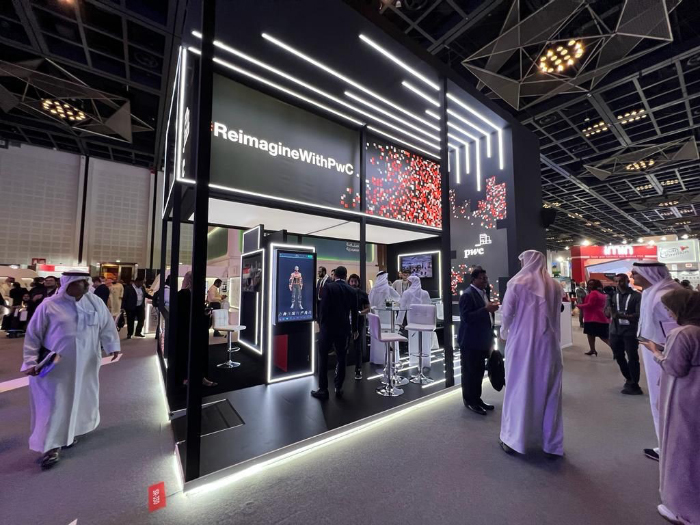At this year’s Ai Everything x GITEX Global held at Dubai World Trade Centre (DWTC) from 10 – 14 October, PwC Middle East demonstrated its reimagination of digital services, with the launch of its latest digital twins report and signing of strategic agreement with one of the leading UAE entities, G42.
According to Gartner, digital twins are one of the most strategic technology trends for 2022, and have been recognised by public organisations as an effective tool for urban planning and management. In the context of a smart city, a digital twin continuously collects information from the built environment via technologies such as sensors, drones and mobile devices to present an up-to-the-second picture – giving urban planners the potential to test ideas and simulations for cities, before real-world implementation.
Virtual and metaverse technologies are a [1]USD 8-13tn opportunity globally and are expected to contribute to 6% of MENA GDP in the next few years. Combined with AI’s potential to bring [2]USD 320bn into the region by 2030, governments, businesses and consumers will see enormous implications.
Exhibiting at GITEX over the five-day AI summit, PwC Middle East invited visitors to engage with its future-focused technologies with a walk-in metaverse experience, and showcased its digital twin capabilities at the #ReimaginewithPwC booth. PwC also headlined the Digital Cities x Ai stage which was inaugurated by His Excellency Omar bin Sultan Al Olama, UAE’s Minister of State for Artificial Intelligence, Digital Economy & Remote Work Application Office, who also visited PwC’s metaverse experience. PwC also showcased alongside its strategic alliances; Microsoft and AWS presenting digital solutions that bring a new value equation to clients.
Commenting on PwC’s presence at Ai Everything x GITEX Global, Stephen Anderson, Partner and Middle East Markets Leader, said: “We’re proud of our extensive participation in this year’s AI Everything x GITEX Global, and are delighted to announce our new strategic agreement with G42, demonstrate digital solutions and launch our latest paper on digital twins in one of the world’s largest and most influential digital ecosystems.”
In line with PwC’s continuous investment in its digital capabilities and its purpose towards accelerating the region’s digital transformation, the firm also announced the signing of its new strategic agreement with G42.
PwC Middle East’s strategic Memorandum of Understanding (MoU) signing with G42 – a leading artificial intelligence and cloud computing company based in Abu Dhabi, comes to drive innovation and uptake of AI across businesses and sectors through combining PwC’s technology consulting prowess with G42’s AI capabilities.
Speaking on the significance of the MoU signing, Mr. Talal Al Kaissi, G42 Cloud CEO, said: “We are proud to join PwC on this exciting partnership, as it marks a milestone in enabling regional customers in their digital transformation experience, to ensure security and strength of their solutions and applications. G42 Cloud’s scalable Cloud infrastructure aims to support both enterprises and government entities in the UAE to smoothly transition to a modernized cloud-based infrastructure and allow them to further enhance their data practice to become data-driven corporations.”
Concurrently, PwC Middle East also launched its latest digital twins paper, titled “How digital twins can make smart cities better” to explore the impact of emerging technologies in bridging the physical and virtual world. The paper has important implications for urban planning in the Middle East with the roll out of Dubai’s 2040 Master Urban Plan and Saudi Arabia’s Vision 2030 programme, set to accelerate urbanisation with the development of major urban areas and mega cities.
Commenting on the launch of the new paper, Kaveh Vessali, Digital, Data & AI Leader, PwC Middle East, said: “We believe digital twins offer numerous benefits, especially as it comes to combining innovations in digital technology with urban operational mechanisms to develop cities of the future. The emerging technology plays a vital role in tackling challenges of massive city expansions through leveraging real-time data, combined with the potential to test ideas or simulate what-if scenarios for facilities, processes and city landscapes before any real-world implementation – even before cities are built or developed.”
He added: “The digital twins model can serve as an effective engagement tool to facilitate discussion among the public and private sectors, civil society and policymakers to provide a feasible path for urban upgrading and benefits for stakeholders to assess, in new and unique ways, and the risks and opportunities of large-scale projects. At PwC Middle East, we’ve been exploring ways to help our clients utilise this technology to optimise decision making in areas such as planning, operations, finance and emissions-reduction while developing their mega urban projects.”

COMMENTS